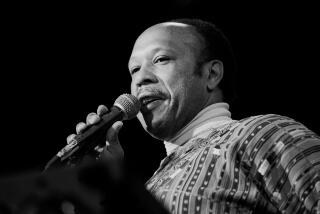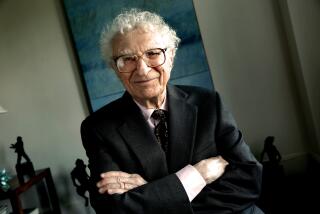Sammy Cahn, Oscar-Winning Lyricist, Dies
- Share via
Sammy Cahn, the burlesque violinist who grew up to write some of America’s favorite songs and win four Academy Awards for such tunes as “Three Coins in the Fountain” and “All the Way,” died Friday. He was 79.
Cahn died at 1 p.m. in Cedars-Sinai Medical Center, where he had been under treatment since Dec. 30 for congestive heart failure, hospital spokesman Ron Wise said.
In addition to the award for “Three Coins in the Fountain,” written for the 1954 film of the same title, the lyricist garnered Oscars in 1957 for “All the Way,” written for the film “The Joker Is Wild”; in 1959 for “High Hopes,” for the film “A Hole in the Head,” and in 1963 for “Call Me Irresponsible,” for the film “Papa’s Delicate Condition.”
Cahn also won an Emmy in 1955 for the witty song “Love and Marriage,” written with composer Jimmy Van Heusen for a musical version of Thornton Wilder’s “Our Town.” The song is now the theme song of the popular television series “Married--With Children.” Cahn also wrote music for the children’s television show “Sesame Street.”
Cahn penned lyrics for such Broadway musicals as “High Button Shoes” in 1947 and “Skyscraper” in 1965, and in 1974 staged a Broadway revue of his songs, titled “Words and Music.”
He was considered the nation’s highest-paid songwriter, often earning more than $1,000 a word.
Cahn, once described by Barbra Streisand as looking “like a Jewish dentist,” was proud of the hucksterism he used to sell his songs.
“I am the king of the demonstrators,” he said. “When we finish a song, my collaborator . . . and I get down to what we consider the most important work. We learn the song--woodshedding, we call it--find the right tempo and phrasing, the right attitude. Then comes the moment of truth: the demonstration.”
Of all vocalists, Cahn was most associated with Frank Sinatra. He wrote such signature songs as “My Kind of Town” and “September of My Years.” Sinatra also popularized Cahn’s “Come Fly With Me,” “Tender Trap,” “Time After Time” and “Saturday Night Is the Loneliest Night of the Week.”
Cahn began working with Sinatra when the singer was with the Tommy Dorsey Orchestra in the 1930s and later wrote songs for a dozen of Sinatra’s films.
Sinatra could not be reached for comment late Friday, spokeswoman Susan Reynolds said.
“I can’t imagine him not being here,” commented Doris Day, for whom Cahn co-wrote her first movie, “Romance on the High Seas.”
“I started in movies because of Sammy Cahn and Julie Styne. They wrote so many fabulous songs for me,” she said. “(Sammy) was really ageless. I thought he would live to be at least 120. He was truly invincible in his spirit.”
Composer Burt Bacharach said Cahn offered to co-write a song with him when he was an unknown, something he always appreciated although the song was never written.
“Sammy was a great lyric writer who always kept going,” Bacharach said. “He was always interested in what he was doing, and stayed alive to write and perform. He never really retired, and I loved that about him too.”
Bacharach’s partner and lyricist Carol Bayer Sager added, “Great songwriting and Sammy Cahn are one and the same. He’s an inspiration to songwriters everywhere because his songs have stood the test of time. As a lyricist, he set a standard that all other lyricists can only hope to aspire to.”
Dancer, singer and actor Gene Kelly, who starred in the Cahn film “Anchors Aweigh,” which featured a hit song of the same name, called him “a great talent.”
Over 33 years, 26 numbers with lyrics by Cahn were nominated for Academy Awards as best song of the year, and in four separate years, two of his songs competed for the award.
The Oscar contenders were written with several composers, most notably Jule Styne and Van Heusen. His many other collaborators included Sammy Fain and George Barrie.
Cahn’s highly successful association with Styne led Time magazine to say the team was as important to popular music as Richard Rodgers and Oscar Hammerstein II were to the theater. Their tunes read like a hit parade--”I’ve Heard That Song Before,” “Let It Snow! Let It Snow! Let It Snow!,” “I’ll Walk Alone,” “Give Me Five Minutes More,” “Time After Time,” “It’s Been a Long, Long Time” and “It’s Magic.”
The lyricist was born Samuel Cohen on June 18, 1913, in New York on, as he put it, “the lowest part of the Lower East Side” to parents he described as “poor but far from humble.”
His mother got her wish that he learn violin, but gave up trying to make him a doctor or lawyer after he dropped out of high school to play in Bowery burlesque and vaudeville houses. The teen-age Cahn often made up ribald parodies for the strippers, and soon formed his own dance band, persuading his pianist, Saul Chaplin, to take over composing chores.
“I played the violin so badly,” Cahn told The Times years later, “I was almost forced into making up songs. It was easier than going to work.”
Cahn, who at 18 wrote his first lyric--”Like Niagara Falls, I’m Falling for You,” achieved almost instant success when he teamed up with Chaplin. The duo wrote “Rhythm Is Our Business” for Cahn’s boyhood chum Jimmy Lunceford, who was appearing at the Apollo Theatre, and the tune was recorded for Decca, scoring an immediate hit.
The partners soon won a contract with Warner Bros. Vitaphone Studios in Brooklyn, which, Cahn often cracked, had the motto: “We don’t want it good--we want it by Thursday!”
Hearing the Yiddish song “Bei Mir Bist Du Schoen” performed at the Apollo, Cahn wrote English lyrics for it and Chaplin composed a new arrangement. Bandleader Tommy Dorsey rejected the tune, but a new trio called the Andrews Sisters recorded it for Decca. The tune and the trio became a smash hit in 1937.
When Vitaphone closed in 1940, Cahn and Chaplin moved to Hollywood, but got no more assignments from Warner Bros. They worked briefly for Columbia, but soon split up.
Cahn’s attempt to enlist in the service during World War II failed because he suffered from ulcers. He later worked for the USO, entertaining troops.
At Cahn’s first encounter with Styne, he put the composer in agony by exclaiming at the first tune he played: “I’ve heard that song before!” No, he assured Styne, he had never heard the melody; those were simply the lyrics he felt belonged with it. The collaboration had begun.
Although Cahn teamed up with several other composers when Styne did a stint on Broadway in the late 1940s, Sinatra got them back together in 1954 for the 20th Century Fox film “Pink Tights.” The film was shelved because Sinatra’s co-star, Marilyn Monroe, backed out, but 20th Century Fox soon offered them “Three Coins in the Fountain.”
Cahn paired with Van Heusen in 1955 to create several Sinatra classics, including the theme song for his film “The Man With the Golden Arm” in 1956. The partnership, which lasted until 1969, also produced a four-part television spectacular in 1959 titled “The Frank Sinatra Show.”
In addition to supplying Sinatra with songs, Cahn wrote material recorded by Dean Martin, Sammy Davis Jr., Vic Damone, Tony Bennett and Rosemary Clooney.
For fun as well as profit, he wrote parodies and original material for show business friends, politicians and corporations. His parody of his own “High Hopes” became John F. Kennedy’s presidential campaign song in 1960.
Cahn’s autobiography, “I Should Care: The Sammy Cahn Story,” was published in 1974.
Elected to the Songwriters Hall of Fame in 1972, Cahn served as its president. He also served as president of the National Academy of Popular Music and was a member of the board and a vice president of the American Society of Composers, Authors and Publishers.
“Sammy was one of our greats and a devoted and dedicated part of the ASCAP family,” ASCAP President Morton Gould said Friday. “As a lyricist, to paraphrase one of his famous lyrics, we would ‘call him irreplaceable.’ ”
Cahn is survived by his second wife, Tita; his son, Stephen, who lives in New York; his daughter, Laurie Cahn of San Francisco, and two grandchildren.
Burial services will be private. Memorial services will be scheduled in Los Angeles and New York at a later date.
More to Read
The biggest entertainment stories
Get our big stories about Hollywood, film, television, music, arts, culture and more right in your inbox as soon as they publish.
You may occasionally receive promotional content from the Los Angeles Times.










